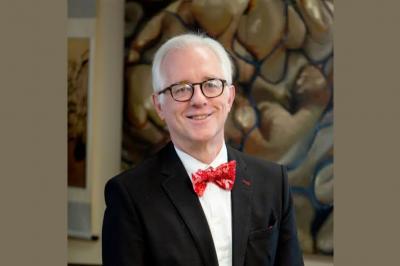It’s been almost 30 years since Dr. Ken Rockwood and a colleague first proposed a strategy to make sure frail patients move while in the hospital. Now, it’s finally becoming a reality.
Under Nova Scotia’s Action for Health plan, new staff will be hired to get frail patients out of bed and walking at least three times a day. Evidence shows this simple daily movement means many patients get out of the hospital sooner and can go home rather than to long-term care.
“What I’m really interested in is to find a way to mobilize the person, who without the mobilization, is in hospital an extra three weeks even though they eventually do get home. And then the next prize is to mobilize the person, who without this, would not have been able to go home at all,” said Dr. Rockwood, a QEII Health Sciences Centre internist-geriatrician and clinician scientist.
Not only is this better for the patient, but it also frees up hospital beds so patients in overcrowded emergency departments can be admitted for care.
Dr. Rockwood says the renewed focus on addressing problems in healthcare has given mobility the attention it deserves. “There was always something more important to do. Now people accept the link with ambulance offload delay… and what that has to do with the mobilization strategy.”
Research shows 83 per cent of older patients in hospital are not moving, spending just three per cent of their time upright and out of bed. The consequences are dire. Twenty per cent of patients who were walking on their own before being admitted to hospital need assistance walking after spending time in a hospital bed. The unvarnished truth is that patients may be inadvertently harmed while in hospital simply because there was no one to help them move.
Getting patients out of bed and walking the hallway takes time and often goes by the wayside because of the shortage of healthcare staff. “Nurses are extremely busy and often too pressed to mobilize this person. Often the default is to ask a physiotherapist to come in and do that,” said Dr. Rockwood. For many patients, that means they aren’t moving on the weekends or in the critical 72-hour window after being admitted to hospital.
Under the new patient mobilization program, recreation therapy associates and rehab assistants will be hired as mobility assistants to staff medical units 12 hours a day, seven days a week at regional healthcare sites across the province. Hiring for 37 full-time equivalent positions is now underway. The new staff will be dedicated to helping moderately frail patients move.
“This is the patient population that does not often need the expertise of a physiotherapist,” said Karen Nicholls, director of policy and planning for the Frailty and Elder Care Network at Nova Scotia Health. “They don’t require physio, but nursing staff, with the current staffing ratios and the complexity of patients on unit, don’t have time to mobilize the patient. There is just no way they can get to them.”
Mobility assistants are new to the Nova Scotia hospital setting, so creating this role won’t pull staff from other areas. Nicholls says it has been possible to get family or volunteers to help patients move, but that doesn’t often work and was discouraged with COVID-19. The skill set also requires the ability to do some coaching. “You just can’t go in the room and say, would you like to walk today, and if they say no then you leave the room. Unfortunately, this is often what happens in hospital now. There is a perception in the community that it’s safer to be in bed. There is a real risk aversion to getting up and moving. We need to help patients, families, and caregivers understand the importance of getting out of bed.”
Instead, Nicholls says trained professionals know how to motivate the patient. “It’s all about how they pose it, and mobility assistants will come with that specific skill set.”
The leading edge of the baby boomers is now turning 75. As the cohort ages and requires hospital care, the need for help with mobility is growing.
Nicholls said, “What we’re currently doing is not working. We have more patients than average headed for long-term care, and it is challenging to find those spaces. This limits beds for people who are medically ill, hence why emergency departments look the way they do. Plus, we have an ageing population. We can’t change how the patients get sick. We need to change how we treat them.”
Mobility assistants will log how many times a patient gets out of bed each day and track their daily steps to monitor progress. Dr. Rockwood is confident staff will quickly see how moving patients makes a difference. “For patients outside the ICU, or not admitted with trauma, the general rule is if they have declined within three days, you should be able to get them back to about half of where they were within three days. And that would be a big gain compared to what happens now.”
Nicholls also wants the broader community to understand why mobility matters, and how it affects the lives of ageing, frail seniors. “I think we need to change the community idea that nursing homes are the gold standard for care. If you need one, they offer good care, but really is that where you want to be? Our north star is to get you home.”
